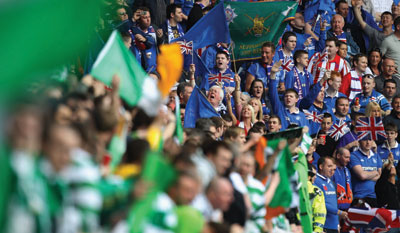
But in recent years, the “Old Firm” rivalry has become increasingly heated, culminating in assault and bomb threats to Celtic manager Neil Lennon, who as a one-time Catholic captain of the Northern Ireland national team has long been a target for loyalists who see the Northern Ireland team as an exclusively Protestant, unionist enterprise.
There are a few factors behind the recent flare-up. Probably the simplest is the fact of the uncompetitiveness of Scottish football. It’s been a very long time since any team had any realistic chance of challenging the big two Glasgow teams for honours. Hence Old Firm games are all, essentially, championship deciders. The clubs meet at least three times a year. Familiarity foments an already toxic contempt.
Beyond this, though, and perhaps counterintuitively, is the death of the armed struggle in Northern Ireland. While the guns and bombs still ruled Belfast, they perhaps provided an anchor for the grievance and, what is more, a stark reminder of the dangers of going too far. Now the war is over, but the hatred and tribalism remain on central stage.
And so Holyrood is to attempt to combat the animosity with the Offensive Behaviour at Football and Threatening Communications Bill. Roseanna Cunningham, the minister responsible for the legislation, has said the bill is “a clear signal to the police, the courts, the football authorities and the clubs, and to the fans and the wider public, that offensive and sectarian behaviour around football matches is simply not acceptable. It is time to end this blight on our national game.” The bill’s wording only barely expands on its title: it pretty much just says that you’re not allowed to behave offensively at the football.
But there are difficulties in application. If Celtic fans emphasise their Irishness with the maudlin anthem “The Fields of Athenry” (“for you stole Trevelyan’s corn/So the young might see the morn”) should Rangers fans not be allowed to sing (to the tune of “Sloop John B”), “The Famine’s over, why don’t you go home?”
The proposed legislation smacks of the something-must-be-donery that so often characterises well-meaning censorship. Meanwhile, in what seems like a deliberate parody, an actual sectarian assault on Lennon, at a match in Edinburgh, was deemed “not proven” by a jury, despite the fact that it was witnessed by thousands and a match steward claimed to have heard the attacker call the Celtic manager a “Fenian bastard”. If Scotland’s courts can’t even convict on common assault on live television, how will they enforce a law against being rude?

